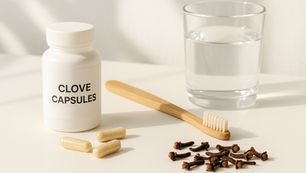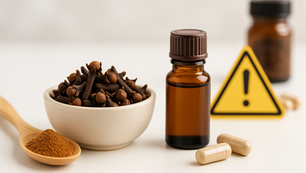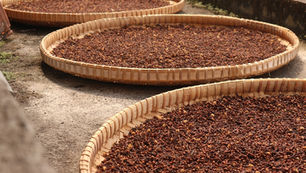top of page
Insights from Nature


Clove Capsules for Men vs Women: Differences in Benefits and Metabolism
Clove capsules are widely used for digestion, oral wellness, antioxidant activity, and general metabolic support. While these benefits apply to nearly all adults, emerging research suggests that clove supplements may influence men and women differently due to variations in hormone balance, enzyme activity, nutrient metabolism, and sex-specific physiology. Understanding these distinctions can help users choose the right dosage, frequency, and format for their individual needs.


Should You Take Clove Supplements Daily? Frequency, Cycling, and Long-Term Use
Many individuals who use herbal products for digestion, antioxidant support, or oral wellness eventually wonder whether a daily clove supplement routine is safe and effective. Clove contains eugenol, one of the most studied plant compounds in traditional and modern health practices, and it appears in a wide range of wellness formulas, including daily clove capsules, chewable tablets, and herbal powder blends. But as with any botanical that has potent bioactive compounds, unde


Clove Capsules for Oral and Dental Support: What the Evidence Says
Clove has long been valued across traditional medicine for its remarkable oral and dental applications. Today, modern consumers increasingly turn to clove capsules for dental health because they offer consistent dosing, convenient delivery, and standardized potency. Whether the goal is maintaining gum comfort, supporting natural microbial balance, or complementing daily oral hygiene, clove supplement for oral care provide an accessible way to harness the properties of clove w


Are Clove Capsules Safe? A Research-Based Look at Dosage, Limits, and Overuse
Clove capsules have become a widely used natural option for supporting digestion, immunity, and antioxidant balance. As interest in herbal supplements continues to grow globally, questions about clove capsules safety, safe daily limits, and potential side effects have become increasingly important. Many users want to understand how much is safe, how clove supplement dosage limits are determined, and what risks may appear with overuse. This guide provides a research-grounded e


Raw Cloves vs Clove Capsules: Which Form Delivers Better Health Benefits?
Clove is one of the most antioxidant-rich botanicals in the world, used for centuries in digestive wellness, oral care, immunity, and metabolic balance. Today, many people wonder whether consuming raw cloves is more beneficial than taking clove capsules. Both forms offer advantages, but they differ in potency, consistency, absorption, and practicality. Understanding these differences helps users choose the best format for their wellness routine.


Clove Buds 101: Spice Your Way to Healthier Days with Science-Backed Insights
Clove, rich in eugenol, supports digestion, oral health, immunity, and antioxidant defense—backed by global research. This 3,000-word evidence-based guide explores its origins, mechanisms, and comparisons to cinnamon and ginger. Discover why this ancient spice remains a cornerstone of wellness. [Read more]


What Diseases Are Cloves Traditionally Used For?
Cloves (Syzygium aromaticum) are aromatic flower buds native to Indonesia but now used worldwide in cooking and natural remedies. Beyond flavor, cloves have a long history in Ayurveda, Traditional Chinese Medicine (TCM), and Middle Eastern herbal practices. For centuries, cloves were believed to treat digestive problems, toothaches, infections, and even chronic conditions. But what diseases were they traditionally used for, and how does this align with modern science?


Best Time to Take Cloves: Morning vs. Night
Cloves (Syzygium aromaticum) are widely used in teas, cooking, and wellness routines. Packed with eugenol and antioxidants, they’re valued for digestive support, oral health, and anti-inflammatory effects. But many people ask: When is the best time to take cloves—morning or night? The answer depends on your goals. Timing may influence how cloves affect digestion, sleep, blood sugar, and overall comfort. Let’s break down the benefits of using cloves at different times of the d


Why Many People Use Cloves in the Morning
Morning routines often set the tone for the entire day. For many people, adding herbs or spices to breakfast rituals provides a sense of balance & well-being. Among these, cloves (Syzygium aromaticum) stand out. Whether infused in warm water, steeped in tea, or sprinkled over oatmeal, cloves have become a common part of morning wellness practices. But why specifically the morning? This article explains the reasons behind this trend, the benefits of starting the day with clove


Eating Cloves Every Day: Benefits and Risks
Cloves (Syzygium aromaticum) are more than a kitchen spice. They’re one of the most antioxidant-rich foods available, packed with compounds like eugenol that give them both their strong flavor and potential health effects. With growing interest in natural remedies, many people wonder: Is it safe to eat cloves every day? This article explores what science says about the benefits, risks, and best practices for daily clove consumption.


Are Cloves Safe for Kidney Health?
Cloves (Syzygium aromaticum) are among the most antioxidant-rich spices, widely used in food, teas, and traditional remedies. But when it comes to kidney health, questions often arise: Do cloves support kidney function, or can they cause harm if overused? The kidneys are vital for filtering waste, balancing fluids, and regulating blood pressure. Because spices like cloves contain active compounds such as eugenol, it’s important to understand both their potential benefits and


What Not to Mix with Cloves: Safety Guide
Cloves (Syzygium aromaticum) are valued for their warm flavor and antioxidant-rich profile. From teas to spice blends, they are a common addition to kitchens and home remedies. But because cloves contain strong active compounds, especially eugenol, they may not be safe to combine with certain medications or herbal supplements. This article highlights what not to mix with cloves, explaining possible interactions and offering tips for safe use.


Side Effects of Cloves: What Science Says
Cloves (Syzygium aromaticum) are known for their rich aroma & long history in cooking, traditional remedies & even dentistry. Packed with antioxidants, especially eugenol, they offer many potential health benefits. But like many herbs & spices, cloves are not risk-free. In large amounts or concentrated forms, they can cause side effects & interact with medications. This article explores what science says about the possible side effects of cloves, helping you use them safely &


Are Cloves Safe During Pregnancy? What Experts Say
Pregnancy is a time when everyday choices—like what you eat or drink—suddenly carry more weight. Many moms-to-be explore natural remedies for nausea, bloating, or dental discomfort. Among the common questions asked in the U.S. is: Are cloves safe during pregnancy? Cloves are often considered harmless as a spice, but safety concerns arise when they are consumed as teas, oils, or supplements. Let’s break down what experts and research say about using cloves while expecting.


Cloves for Women’s Health: Key Benefits You Should Know
Cloves (Syzygium aromaticum) are a familiar spice in American kitchens, often used in holiday recipes & herbal teas. But beyond their aroma & flavor, cloves are rich in natural compounds that may support women’s health in unique ways. Researchers have studied how cloves affect digestion, menstrual comfort, bone health & even metabolic balance. This article takes a closer look at what the science says about cloves for women, highlighting key benefits, safety considerations & p


How to Soak Cloves in Water: A Simple Guide
Clove water has become a popular wellness habit in the United States, especially among people looking for simple, natural ways to support digestion, hydration, & overall health. The preparation is straightforward: soak a few cloves in water overnight and drink the infusion the next morning. But how exactly should you soak cloves in water for the best results? How long is enough, & how many cloves should you use? This guide breaks it down step by step, supported by science and


Clove Water and Women’s Health: Myths and Facts
Across wellness forums and social media, clove water has been praised as a natural remedy for everything from skin glow to menstrual comfort. Many women in the U.S. are curious: Is clove water truly a health booster, or is it just another internet trend? This article takes a closer look at how clove water may affect women’s health—sorting real benefits from myths, while highlighting safety considerations. What Is Clove Water?


Cloves: Benefits, Side Effects, and Everyday Uses Explained
Cloves (Syzygium aromaticum) are more than just a fragrant spice you might find in pumpkin pie or mulled cider. For centuries, they have been valued in traditional medicine across Asia, the Middle East, and Europe. In recent years, people in the United States have become increasingly interested in how everyday herbs like cloves can support wellness naturally. But beyond their warm flavor, what does science say about cloves? This article offers an evidence-based guide to clove


Herbal Beauty Hacks with Clove
In the modern clean beauty movement, herbs are reclaiming their place in skincare—and clove is emerging as a superstar. While it’s best known for digestive or immune support, clove extract and fresh cloves are now making waves in the world of DIY beauty. This spice, rich in eugenol and antioxidants, provides a natural way to combat acne, clarify the scalp, and improve hair shine.


Clove in Parasite Cleanse: Science or Just Herbal Myth?
Why Parasite Cleansing Has Captivated Modern Wellness. Across wellness communities in the U.S., Australia, and globally, interest in parasite cleanses has grown steadily since 2022. From Reddit forums to TikTok videos with millions of views, the idea of eliminating hidden parasites to improve digestion, energy, and skin health is now a popular theme. Herbal protocols featuring wormwood, black walnut, and clove have emerged as leading choices in natural detox regimens.


Clove Oil for Skin and Hair: Natural Remedies with Science
Clove oil, especially when derived from organic clove buds, has made a resurgence in modern beauty and wellness routines. For generations, cultures across Asia and the Middle East have used clove essential oil as a natural remedy for skin irritations and scalp health. Today, scientific validation supports many of these traditional claims, offering clear guidance on how and why clove oil works.


How to Use Clove at Home: DIY Remedies That Actually Work
Clove is not just a spice you dust over holiday desserts. This small, aromatic bud has been a go-to in natural medicine cabinets for centuries. Whether you are dealing with a stubborn toothache, a sore throat that won’t quit, or an upset stomach, clove has been trusted across cultures for its healing potential. Today, it’s enjoying a modern resurgence as people search for affordable, science-backed, and accessible alternatives to over-the-counter drugs.


Where Do Cloves Come From? Global Origins and Top Producers
Cloves are more than just a kitchen spice—they’re part of a centuries-old agricultural legacy, deeply rooted in tropical islands and spice trade routes. Today, as consumers increasingly turn to organic clove supplements, essential oils, and culinary cloves, interest in the origins and quality of these aromatic buds is rising. But where exactly do your cloves come from? Which countries lead the world in growing, harvesting, and exporting this powerhouse botanical? Let’s explor


Clove for Digestive Wellness: Why It's in Every Herbalist’s Toolkit
If you’ve ever sipped on a spicy herbal tea after a heavy meal or reached for an all-natural gut remedy, there’s a good chance clove was one of the ingredients working behind the scenes. Long revered in Ayurvedic and traditional medicine, clove is not just a warming spice—it’s a potent herbal ally for digestive health. From relieving bloating to enhancing enzymatic function, this tiny bud has earned its place in herbal medicine cabinets around the world. But why does it work
bottom of page